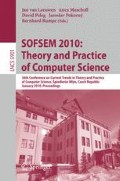Abstract
Regret minimization has proven to be a very powerful tool in both computational learning theory and online algorithms. Regret minimization algorithms can guarantee, for a single decision maker, a near optimal behavior under fairly adversarial assumptions. I will discuss a recent extensions of the classical regret minimization model, which enable to handle many different settings related to job scheduling, and guarantee the near optimal online behavior.
Access this chapter
Tax calculation will be finalised at checkout
Purchases are for personal use only
Preview
Unable to display preview. Download preview PDF.
References
Auer, P., Cesa-Bianchi, N., Fischer, P.: Finite-Time Analysis of the Multi-Armed Bandit Problem. Machine Learning 47(2-3), 235–256 (2002)
Auer, P., Cesa-Bianchi, N., Freund, Y., Schapire, R.E.: The Nonstochastic Multiarmed Bandit Problem. SIAM Journal on Computing 32(1), 48–77 (2002); (A preliminary version appeared in FOCS 1995 as Gambling in a Rigged Casino: The Adversarial Multi-Armed Bandit Problem)
Awerbuch, B., Kleinberg, R.: Online Linear Optimization and Adaptive Routing. J. Comput. Syst. Sci. 74(1), 97–114 (2008)
Awerbuch, B., Mansour, Y.: Adapting to a Reliable Network Path. In: PODC, pp. 360–367 (2003)
Blum, A., Mansour, Y.: From External to Internal Regret. Journal of Machine Learning Research 8, 1307–1324 (2007)
Blum, A., Burch, C.: On-Line Learning and the Metrical Task System Problem. In: COLT, pp. 45–53 (1997)
Blum, A., Burch, C., Kalai, A.: Finely-Competitive Paging. In: FOCS, pp. 450–458 (1999)
Blum, A., Chawla, S., Kalai, A.: Static Optimality and Dynamic Search-Optimality in Lists and Trees. Algorithmica 36(3), 249–260 (2003)
Borodin, A., El-Yaniv, R.: Online Computation and Competitive Analysis. Cambridge University Press, Cambridge (1998)
Borodin, A., El-Yaniv, R.: Online Computation and Competitive Analysis. Cambridge University Press, Cambridge (1998)
Cesa-Bianchi, N., Lugosi, G.: Prediction, Learning and Games. Cambridge University Press, Cambridge (2006)
Cesa-Bianchi, N., Lugosi, G.: Prediction, Learning, and Games. Cambridge University Press, New York (2006)
Cesa-Bianchi, N., Freund, Y., Helmbold, D.P., Haussler, D., Schapire, R.E., Warmuth, M.K.: How to Use Expert Advice. Journal of the ACM 44(3), 427–485 (1997); (A preliminary version appeared in STOC 1993)
Cesa-Bianchi, N., Lugosi, G.: Potential-Based Algorithms in On-Line Prediction and Game Theory. Machine Learning 51(3), 239–261 (2003)
Even-Dar, E., Kleinberg, R., Mannor, S., Mansour, Y.: Online Learning for Global Cost Functions. In: COLT (2009)
Foster, D., Vohra, R.: Regret in the On-Line Decision Problem. Games and Economic Behavior 21, 40–55 (1997)
Foster, D.P., Vohra, R.V.: A Randomization Rule for Selecting Forecasts. Operations Research 41(4), 704–709 (1993)
Freund, Y., Schapire, R.E., Singer, Y., Warmuth, M.K.: Using and Combining Predictors that Specialize. In: STOC, pp. 334–343 (1997)
Freund, Y., Schapire, R.E.: A Decision-Theoretic Generalization of On-Line Learning and an Application to Boosting. In: Euro-COLT, pp. 23–37. Springer, Heidelberg (1995)
Hannan, J.: Approximation to Bayes Risk in Repeated Plays. In: Dresher, M., Tucker, A., Wolfe, P. (eds.) Contributions to the Theory of Games, vol. 3, pp. 97–139. Princeton University Press, Princeton (1957)
Hart, S., Mas-Colell, A.: A Simple Adaptive Procedure Leading to Correlated Equilibrium. Econometrica 68, 1127–1150 (2000)
Kakade, S.M., Tauman-Kalai, A., Ligett, K.: Playing Games with Approximation Algorithms. In: STOC, pp. 546–555 (2007)
Kalai, A., Vempala, S.: Efficient Algorithms for Online Decision Problems. Journal of Computer and System Sciences 71(3), 291–307 (2005); An earlier version appeared in COLT (2003)
Kalai, A., Vempala, S.: Efficient Algorithms for On-Line Optimization. J. of Computer Systems and Science (JCSS) 71(3), 291–307 (2005); (A preliminary version appeared in COLT 2003)
Lai, T.L., Robbins, H.: Asymptotically Efficient Adaptive Allocations Rules. Advances in Applied Mathmatics 6, 4–22 (1985)
Lehrer, E.: A Wide Range No-Regret Theorem. Games and Economic Behavior 42, 101–115 (2003)
Littlestone, N., Warmuth, M.K.: The Weighted Majority Algorithm. Information and Computation 108, 212–261 (1994)
Robbins, H.: Some Aspects of the Sequential Design of Experiments. Bulletin of the American Mathematical Society 58, 527–535 (1952)
Author information
Authors and Affiliations
Editor information
Editors and Affiliations
Rights and permissions
Copyright information
© 2010 Springer-Verlag Berlin Heidelberg
About this paper
Cite this paper
Mansour, Y. (2010). Regret Minimization and Job Scheduling. In: van Leeuwen, J., Muscholl, A., Peleg, D., Pokorný, J., Rumpe, B. (eds) SOFSEM 2010: Theory and Practice of Computer Science. SOFSEM 2010. Lecture Notes in Computer Science, vol 5901. Springer, Berlin, Heidelberg. https://doi.org/10.1007/978-3-642-11266-9_6
Download citation
DOI: https://doi.org/10.1007/978-3-642-11266-9_6
Publisher Name: Springer, Berlin, Heidelberg
Print ISBN: 978-3-642-11265-2
Online ISBN: 978-3-642-11266-9
eBook Packages: Computer ScienceComputer Science (R0)

